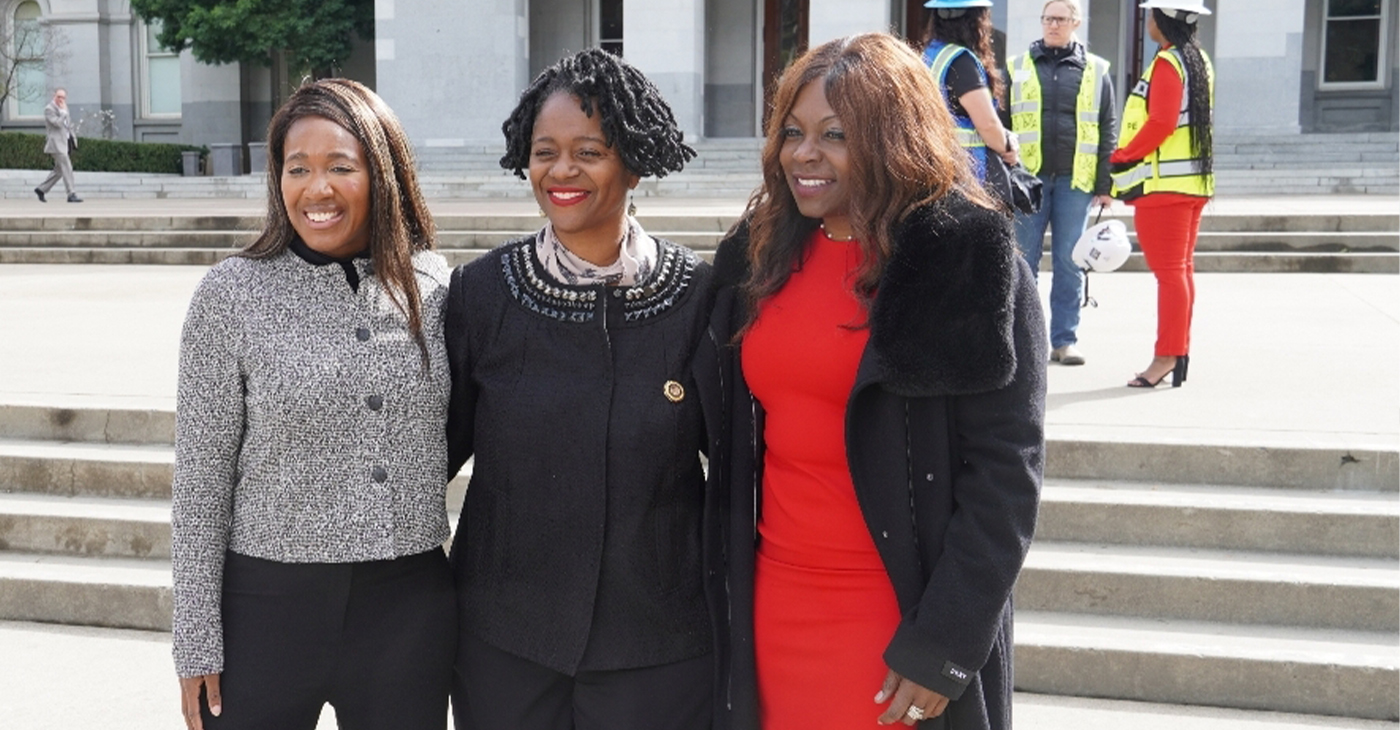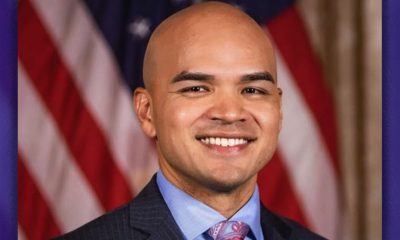Politics
Justice Dept. Unveils New Guidelines for US News Leak Probes

In this Dec. 1, 2014 file photo, Attorney General Eric Holder speaks at Ebenezer Baptist Church in Atlanta. The Justice Department on Wednesday announced revised guidelines for obtaining records from the news media during leak investigations, removing language that news organizations said was ambiguous and requiring additional consultation before a journalist can be subpoenaed. (AP Photo/David Goldman, File)
ERIC TUCKER, Associated Press
WASHINGTON (AP) — The Justice Department on Wednesday announced revised guidelines for obtaining records from the news media during criminal leak investigations, removing language that news organizations said was ambiguous and requiring additional levels of review before a journalist can be subpoenaed.
The updated policy revises protocols announced last year amid outrage among news organizations over Obama administration tactics.
The new guidelines come just days after the Justice Department formally abandoned a years-long effort to compel a New York Times reporter to testify in the trial of a former CIA officer accused of disclosing classified information. The actions, taken together, are signs of a more modulated approach for an administration long criticized for its aggressive handling of leak cases.
“These revised guidelines strike an appropriate balance between law enforcement’s need to protect the American people and the news media’s role in ensuring the free flow of information,” Attorney General Eric Holder said Wednesday.
The Justice Department began reviewing its own longstanding guidelines in 2013 and last February issued new rules designed to give news organizations an opportunity to challenge subpoenas or search warrants in federal court. But news organizations expressed concern that the protections applied only to journalists involved in “ordinary newsgathering activities,” language they said was vague and could be exploited by zealous prosecutors.
That provision has been deleted in the new guidelines, which also require the attorney general in most instances to authorize subpoenas issued for the media and for the Justice Department’s criminal division to also be consulted.
“We are very pleased the Justice Department took our concerns seriously and implemented changes that will strengthen the protection of journalists for years to come, with the public being the ultimate beneficiary,” said AP President and CEO Gary Pruitt.
AP General Counsel Karen Kaiser praised the changes for eliminating “potential ambiguity of what constitutes newsgathering and help provide consistency in how the guidelines are interpreted across investigations and administrations.”
The guidelines could “play an even more important role” now in protecting source confidentiality since the Supreme Court last year passed up a chance to provide clarity on the issue and Congress has yet to enact a federal reporter shield law, said Bruce Brown, executive director of the Reporters Committee for Freedom of the Press.
“To have a strong policy like this that presumes so much in favor of reporter/source confidentiality is a very significant turn of events,” he said.
The Obama administration has been criticized for bringing more leak cases than all predecessors combined, with media organizations particularly critical of maneuvers they said were needlessly aggressive and intrusive into newsgathering operations.
Under Holder, the department secretly subpoenaed telephone records from Associated Press reporters and editors during an investigation into a 2012 story about a foiled terror plot, and obtained a search warrant for the emails of a Fox News journalist as part of another probe.
But in the last year, the twilight of Holder’s six-year tenure as attorney general, the department has shown signs of softening its stance.
Holder, for one, has publicly expressed regret for the actions in the Fox News case and has repeatedly said no journalist would go to jail under his watch for doing his or her job.
Last month, the Justice Department said it would no longer try to force New York Times reporter James Risen to reveal his sources in the trial of ex-CIA officer Jeffrey Sterling, which opened this week in Virginia. On Monday, prosecutors formally announced that they were abandoning efforts to seek any testimony from him after they said Risen made it clear that he “will not answer questions that go to the heart of the case.”
Lucy Dalglish, dean of the Philip Merrill College of Journalism at the University of Maryland, said any shift in Justice Department practice should not be mistaken as a newfound sign of benevolence for the news media. Instead, federal prosecutors are aware that a subpoena to a journalist inevitably causes prolonged court fights and a public-relations bruising, and so have looked for other ways to build criminal cases against leakers.
“It’s time-consuming, it’s expensive, it takes your attention away from what you’re trying to accomplish,” she said of going after journalists “And I believe that, in recent years, they have become more confident that they can handle these cases without cooperation from journalists.”
But, she added, “If they didn’t think they had the tools to pull off these investigations, they wouldn’t be giving the media a break.”
___
Follow Eric Tucker on Twitter at http://www.twitter.com/etuckerAP
Copyright 2015 The Associated Press. All rights reserved. This material may not be published, broadcast, rewritten or redistributed.
Activism
Sen. Lola Smallwood-Cuevas Honors California Women in Construction with State Proclamation, Policy Ideas
“Women play an important role in building our communities, yet they remain vastly underrepresented in the construction industry,” Smallwood-Cuevas stated. “This resolution not only recognizes their incredible contributions but also the need to break barriers — like gender discrimination.

By Antonio Ray Harvey, California Black Media
To honor Women in Construction Week, Sen. Lola Smallwood-Cuevas (D-Los Angeles), a member of the California Legislative Black Caucus (CLBC), introduced Senate Concurrent Resolution (SCR) 30 in the State Legislature on March 6. This resolution pays tribute to women and highlights their contributions to the building industry.
The measure designates March 2, 2025, to March 8, 2025, as Women in Construction Week in California. It passed 34-0 on the Senate floor.
“Women play an important role in building our communities, yet they remain vastly underrepresented in the construction industry,” Smallwood-Cuevas stated. “This resolution not only recognizes their incredible contributions but also the need to break barriers — like gender discrimination.
Authored by Assemblymember Liz Ortega (D-San Leandro), another bill, Assembly Concurrent Resolution (ACR) 28, also recognized women in the construction industry.
The resolution advanced out of the Assembly Committee on Rules with a 10-0 vote.
The weeklong event coincides with the National Association of Women In Construction (NAWIC) celebration that started in 1998 and has grown and expanded every year since.
The same week in front of the State Capitol, Smallwood, Lt. Gov. Eleni Kounalakis, Assemblymember Josh Hoover (R-Folsom), and Assemblymember Maggie Krell (D-Sacramento), attended a brunch organized by a local chapter of NAWIC.
Two of the guest speakers were Dr. Giovanna Brasfield, CEO of Los Angeles-based Brasfield and Associates, and Jennifer Todd, President and Founder of LMS General Contractors.
Todd is the youngest Black woman to receive a California’s Contractors State License Board (A) General Engineering license. An advocate for women of different backgrounds, Todd she said she has been a woman in construction for the last 16 years despite going through some trying times.
A graduate of Arizona State University’s’ Sandra Day O’Connor College of Law, in 2009 Todd created an apprenticeship training program, A Greener Tomorrow, designed toward the advancement of unemployed and underemployed people of color.
“I always say, ‘I love an industry that doesn’t love me back,’” Todd said. “Being young, female and minority, I am often in spaces where people don’t look like me, they don’t reflect my values, they don’t reflect my experiences, and I so persevere in spite of it all.”
According to the U.S. Bureau of Labor Statistics, only 11.2% of the construction workforce across the country are female. Overall, 87.3% of the female construction workers are White, 35.1% are Latinas, 2.1% are Asians, and 6.5% are Black women, the report reveals.
The National Association of Home Builders reported that as of 2022, the states with the largest number of women working in construction were Texas (137,000), California (135,000) and Florida (119,000). The three states alone represent 30% of all women employed in the industry.
Sen. Susan Rubio (D-Baldwin Park) and the California Legislative Women’s Caucus supported Smallwood-Cuevas’ SCR 30 and requested that more energy be poured into bringing awareness to the severe gender gap in the construction field.
“The construction trade are a proven path to a solid career. and we have an ongoing shortage, and this is a time for us to do better breaking down the barriers to help the people get into this sector,” Rubio said.
Bay Area
Five Years After COVID-19 Began, a Struggling Child Care Workforce Faces New Threats
Five years ago, as COVID-19 lockdowns and school closures began, most early educators continued to work in person, risking their own health and that of their families. “Early educators were called essential, but they weren’t provided with the personal protective equipment they needed to stay safe,” said CSCCE Executive Director Lea Austin. “There were no special shopping hours or ways for them to access safety materials in those early and scary months of the pandemic, leaving them to compete with other shoppers. One state even advised them to wear trash bags if they couldn’t find PPE.”

UC Berkeley News
In the first eight months of the COVID-19 pandemic alone, 166,000 childcare jobs were lost across the nation. Significant recovery didn’t begin until the advent of American Rescue Plan Act (ARPA) Child Care Stabilization funds in April 2021.
Today, child care employment is back to slightly above pre-pandemic levels, but job growth has remained sluggish at 1.4% since ARPA funding allocations ended in October 2023, according to analysis by the Center for the Study of Child Care Employment (CSCCE) at UC Berkeley. In the last six months, childcare employment has hovered around 1.1 million.
Yet more than two million American parents report job changes due to problems accessing child care. Why does the childcare sector continue to face a workforce crisis that has predated the pandemic? Inadequate compensation drives high turnover rates and workforce shortages that predate the pandemic. Early childhood educators are skilled professionals; many have more than 15 years of experience and a college degree, but their compensation does not reflect their expertise. The national median hourly wage is $13.07, and only a small proportion of early educators receive benefits.
And now a new round of challenges is about to hit childcare. The low wages paid in early care and education result in 43% of early educator families depending on at least one public support program, such as Medicaid or food stamps, both of which are threatened by potential federal funding cuts. Job numbers will likely fall as many early childhood educators need to find jobs with healthcare benefits or better pay.
In addition, one in five child care workers are immigrants, and executive orders driving deportation and ICE raids will further devastate the entire early care and education system. These stresses are part of the historical lack of respect the workforce faces, despite all they contribute to children, families, and the economy.
Five years ago, as COVID-19 lockdowns and school closures began, most early educators continued to work in person, risking their own health and that of their families. “Early educators were called essential, but they weren’t provided with the personal protective equipment they needed to stay safe,” said CSCCE Executive Director Lea Austin. “There were no special shopping hours or ways for them to access safety materials in those early and scary months of the pandemic, leaving them to compete with other shoppers. One state even advised them to wear trash bags if they couldn’t find PPE.”
The economic impact was equally dire. Even as many providers tried to remain open to ensure their financial security, the combination of higher costs to meet safety protocols and lower revenue from fewer children enrolled led to job losses, increased debt, and program closures.
Eventually, the federal government responded with historic short-term investments through ARPA, which stabilized childcare programs. These funds provided money to increase pay or provide financial relief to early educators to improve their income and well-being. The childcare sector began to slowly recover. Larger job gains were made in 2022 and 2023, and as of November 2023, national job numbers had slightly surpassed pre-pandemic levels, though state and metro areas continued to fluctuate.
Many states have continued to support the workforce after ARPA funding expired in late 2024. In Maine, a salary supplement initiative has provided monthly stipends of $240-$540 to educators working in licensed home- or center-based care, based on education and experience, making it one of the nation’s leaders in its support of early educators. Early educators say the program has enabled them to raise wages, which has improved staff retention. Yet now, Governor Janet Mills is considering cutting the stipend program in half.
“History shows that once an emergency is perceived to have passed, public funding that supports the early care and education workforce is pulled,” says Austin. “You can’t build a stable childcare workforce and system without consistent public investment and respect for all that early educators contribute.”
The Center for the Study of Childcare Employment is the source of this story.
Alameda County
Trump Order Slashes Federal Agencies Supporting Minority Business and Neighborhood Development
The latest executive order targeted several federal agencies, including the Minority Business Development Agency (MBDA) and the Community Development Financial Institutions Fund, ordering that their programs and staff be reduced “to the minimum presence and function required by law.” The executive order targeted more agencies that Trump “has determined are unnecessary,” the order stated.

By Brandon Patterson
On March 14, President Trump signed an executive order slashing the operations of two federal agencies supporting growth in minority business and neighborhoods as he continued his attacks on programs supporting people of color and on the size of the federal bureaucracy.
The latest executive order targeted several federal agencies, including the Minority Business Development Agency (MBDA) and the Community Development Financial Institutions Fund, ordering that their programs and staff be reduced “to the minimum presence and function required by law.” The executive order targeted more agencies that Trump “has determined are unnecessary,” the order stated.
The MBDA’s mission is to “promote the growth and global competitiveness” of minority business enterprises, or MBEs. In 2023, according to its website, the agency helped MBEs access $1.5 billion in capital and facilitated nearly $3.8 billion in contracts awarded to minority business enterprises. It also helped MBEs create or sustain more than 19,000 jobs nationwide. Similarly, the CDFI Fund supports economic growth in under-invested communities by providing funding and technical assistance to local CDFIs, including banks, loan funds, and credit unions, that support community development projects in cities across the country. In 2023, the fund supported more than 1,400 local CDFIs across the country, including more than 80 in California — among the highest number for any state in the country.
The MBDA has local satellite business centers operated by organizations that support minority clients with services such as business consulting, contract bid preparation, loan packaging, and accessing capital funding. The San Francisco Bay Area business center is San Jose, operated by San Francisco-based organization Asian, Inc. Meanwhile, local Oakland CDFIs supported by the federal CDFI fund since 2021 include Habitat Community Capital, TMC Community Capital, Gateway Bank Federal Savings Bank, Beneficial State Bancorp, Inc., and Main Street Launch.
“It is clear that the hollowing out of the CDFI Fund and MBDA is not being ordered because those programs have failed in their mission,” the CEO of Small Business Majority John Arensmeyer, a national organization that advocates for small businesses, said in a statement on Saturday. “Instead, it is yet another case of President Trump using DEI as a club to eviscerate programs that seek to level our economic playing field.”
Congresswoman Lateefah Simon also slammed the decision in a statement to the Oakland Post. “As a member of the House Small Business Committee who represents multiple CDFIs in CA-12, I believe Trump’s gutting of operations at the Minority Business Development Agency and at the Community Development Financial Institutions Fund is a direct attack on small businesses, communities of color and other underserved communities,” Rep. Simon said. “Both the MBDA and the CDFI Fund were created with bipartisan support to help historically underserved communities and small businesses — and both programs have helped to dramatically change the material realities of people and bolster entrepreneurship in the U.S. There is no logic to this decision. The point is discrimination and cruelty.”
-

 #NNPA BlackPress3 weeks ago
#NNPA BlackPress3 weeks agoTarget Takes a Hit: $12.4 Billion Wiped Out as Boycotts Grow
-

 Activism3 weeks ago
Activism3 weeks agoUndocumented Workers Are Struggling to Feed Themselves. Slashed Budgets and New Immigration Policies Bring Fresh Challenges
-

 #NNPA BlackPress4 weeks ago
#NNPA BlackPress4 weeks agoBREAKING Groundbreaking Singer Angie Stone Dies in Car Accident at 63
-

 Activism4 weeks ago
Activism4 weeks agoOakland Post: Week of February 26 – March 4, 2025
-

 #NNPA BlackPress4 weeks ago
#NNPA BlackPress4 weeks agoNAACP Legend and Freedom Fighter Hazel Dukes Passes
-

 Arts and Culture3 weeks ago
Arts and Culture3 weeks agoBeverly Lorraine Greene: A Pioneering Architect and Symbol of Possibility and Progress
-

 #NNPA BlackPress4 weeks ago
#NNPA BlackPress4 weeks agoTrump Kicks the Ukrainian President Out of the White House
-

 #NNPA BlackPress4 weeks ago
#NNPA BlackPress4 weeks agoApple Shareholders Reject Effort to Dismantle DEI Initiatives, Approve $500 Billion U.S. Investment Plan























































